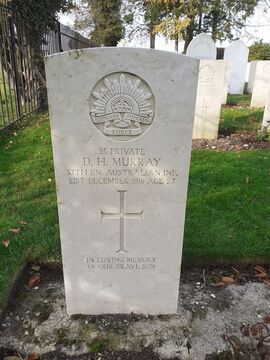
MURRAY, Donald Hector
| Service Number: | 35 |
|---|---|
| Enlisted: | Not yet discovered |
| Last Rank: | Private |
| Last Unit: | 37th Infantry Battalion |
| Born: | Lake Bolac, Victoria, Australia, 27 December 1889 |
| Home Town: | Lake Bolac, Ararat, Victoria |
| Schooling: | Not yet discovered |
| Occupation: | Farmer |
| Died: | Tubercular Pleurisy, Fargo Military Hospital, Wiltshire, England, 21 December 1916, aged 26 years |
| Cemetery: |
Durrington Cemetery, Wiltshire |
| Memorials: | Ararat Shire of Ararat WWI Roll of Honor, Australian War Memorial Roll of Honour, Lake Bolac & District Roll of Honour, Lake Bolac War Memorial |
World War 1 Service
| 3 Jun 1916: | Involvement Private, 35, 37th Infantry Battalion, --- :embarkation_roll: roll_number: '17' embarkation_place: Melbourne embarkation_ship: HMAT Persic embarkation_ship_number: A34 public_note: '' | |
|---|---|---|
| 3 Jun 1916: | Embarked Private, 35, 37th Infantry Battalion, HMAT Persic, Melbourne |
Help us honour Donald Hector Murray's service by contributing information, stories, and images so that they can be preserved for future generations.
Add my storyBiography contributed by Cathy Sedgwick
The summary below was completed by Cathy Sedgwick – Facebook “WW1 Australian War Graves in England/UK/Scotland/Ireland”
Died on this date – 21st December…… Donald Hector Murray was born at Lake Bolac, Victoria on 27th December, 1889.
He enlisted in the Australian Imperial Force (A.I.F.) on 17th April, 1916 as a 26 year old, single, Farmer from Lake Bolac, Victoria/
Private Donald Hector Murray, Service number 35, embarked from Melbourne, Victoria on HMAT Persic (A34) on 3rd June, 1916 with the 10th Infantry Brigade, 37th Infantry Battalion, Headquarters & disembarked at Plymouth, England on 25th July, 1916.
Reinforcements were only given basic training in Australia. Training was completed in training units in England. Some of these were located in the Salisbury Plain & surrounding areas in the county of Wiltshire.
Private Donald Hector Murray was assigned as a Batman attached to Headquarters, 37th Battalion. (“A batman was in British Army parlance an officer's uniformed servant or orderly, supposedly taken on as a voluntary extra duty, for which the officer paid for the service. In addition to his normal duties, the batman was responsible for the officers clothing and kit and also in preparing and serving meals. The duties varied depending on the officer's rank and role and whether he was serving in barracks, on training or on operations. In the trenches, a batman carried his personal weapon and often acted as a bodyguard, while the officer carried out his duties as a platoon, company or battalion commander. Senior officers on the staff and in command positions were entitled to a personal staff, including a batman. It was usual to seek a volunteer from the senior officer's regiment who was detached from the regiment and posted to the senior officer's headquarters or unit.”)
He was admitted to Fargo Military Hospital, Wiltshire on 2nd September, 1916 with Influenza.
On 30th November, 1918 Private Murray’s condition was reported as serious with Paratyphoid in Fargo Military Hospital, Wiltshire.
A telegram to Private Murray’s father was sent on 6th December, 1916 advising that his son was seriously ill in Fargo Military Hospital.
Private Donald Hector Murray died at 10.30 a.m. on 21st December, 1916 at Fargo Military Hospital, Wiltshire, England from Tubercular Pleurisy.
He was buried in Durrington Cemetery, Wiltshire, England where 140 other WW1 Australian War Graves are located.
(The above is a summary of my research. The full research can be found by following the link below)
https://ww1austburialsuk.weebly.com/me---q.html









